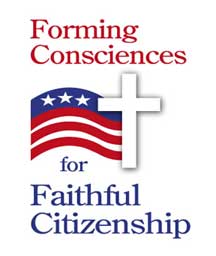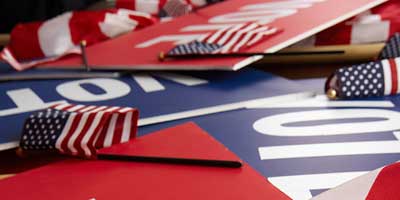
By Don Clemmer
U.S. Conference of Catholic Bishops
 “We don’t tell them who to vote for. We don’t want to tell them who to vote for!”
“We don’t tell them who to vote for. We don’t want to tell them who to vote for!”
That’s what one Midwestern bishop said following the USCCB’s November 2007 meeting in Baltimore, where the bishops had overwhelmingly approved the document Forming Consciences for Faithful Citizenship on political responsibility.
His comment reflected the fact that the document, at its heart, is a call for Catholics to get involved in the political process, not a voting guide. It also reflected the church’s practice of not endorsing political parties or candidates.
Of course, this doesn’t remove the church from the political arena entirely. A person would have to live in a concrete bunker to miss the fact that the bishops have plenty of positions on political issues and public policy — from battles over religious freedom and the definition of marriage to the perennial advocacy against abortion and for immigration reform and peace in the Middle East.
Surely the bishops must have some inkling of what issues should be important to Catholics when they vote.
They do. But they also recognize that voting is a moral choice. And the responsibility for that choice ultimately falls with the individual.
To help Catholic voters in this task, Forming Consciences for Faithful Citizenship emphasizes two principles: a well-formed conscience and the virtue of prudence.
The bishops are quick to point out that conscience is not the freebie it might initially seem to be. It’s not “something that allows us to justify doing whatever we want, nor is it a mere ‘feeling’ about what we should or should not do.”
They call conscience “the voice of God resounding in the human heart” (nothing intimidating about that), something that “always requires serious attempts to make sound moral judgments.”
Being a faithful citizen requires a well-formed conscience. This concept is so central to church teaching that the bishops made it the title of their document. Forming one’s conscience is an ongoing process aided by reading Scripture, reflecting on church teaching, studying the issues and, of course, praying.
Prudence is the virtue that enables people to discern the right thing to do in specific, everyday circumstances and then act. Like a well-formed conscience, this comes with some caveats. For instance, Catholics must recognize that there are morally unacceptable ways of pursuing moral goals (i.e. the ends don’t justify the means).
The bishops readily acknowledge that there are different ways to respond to various social concerns, but they also say no one is excused from helping to build a more just, peaceful world.
The bishops also strongly note that certain intrinsically evil acts — such as abortion and racism — must always be opposed.
And then there’s the fact that voting is essentially the most morally imperfect act one can ever engage in within the political process. The moral certainty of principle gets boiled down into these messy, unreliable things called candidates, who are prone to contradictions and swayed by public opinion. Nor does the voter have the luxury of saying, “I’ll take Candidate A’s positions regarding human life, but Candidate B’s positions on human dignity.”
In the face of this, it would be difficult to blame the bishops for throwing up their hands and saying to lay Catholics, “You figure it out!”
However, the truth is not a surrender of responsibility, but rather a recognition of it.
Holding up conscience and prudence in the political process sends the message that the bishops take the U.S. Catholic faithful seriously by giving them this challenge. It recognizes that they play a unique role in the ongoing interplay between church and society and that no one, not even the bishops, can do it for them.
Don Clemmer is the Assistant Director of Media Relations for the US Conference of Catholic Bishops.

